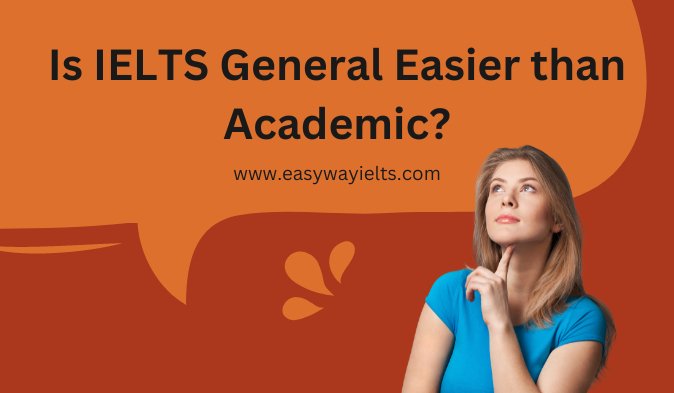The very first question comes in mind, “Is IELTS General Easier than Academic?” When starting a career or studying abroad in an English-speaking nation, it’s common to need to prove your language skills via standardized exams.
IELTS, or the International English Language Testing System, is one of the most well-known tests. But in the world of IELTS, there are two different versions: Academic and General Training.
The decision of which test to take can be crucial for a lot of applicants. Is it simpler to use version A or version B? Are the differences big enough to matter when making a decision?
This essay explores the intricacies of the IELTS General and Academic exams, looking at their distinctive qualities, analyzing the difficulties they provide, and trying to answer the question: Is the General exam really simpler than the Academic version?
Come along as we analyze each aspect associated with this assessment, giving you the information you need to make a wise decision as you pursue international education.
What is IELTS: Academic and General Training
IELTS, the International English Language Testing System, is a standardized test designed to assess the language proficiency of individuals who want to study or work in English-speaking countries.
It is recognized globally and accepted by educational institutions, employers, immigration authorities, and professional bodies in many countries.
There are two main versions of the IELTS test: Academic and General Training. You also can check IELTS Result online. Each version is tailored to assess different language skills, depending on the purpose for which the test taker needs the results.
IELTS Academic
- Purpose – This version is primarily for individuals planning to study at undergraduate or postgraduate levels or seeking professional registration in an English-speaking environment.
- Focus – The Academic test evaluates the test taker’s ability to understand and use complex academic language and texts. It assesses whether the individual is ready to begin studying or training in an English-speaking environment.
- Components – IELTS Academic has 4 modules. Let’s read about each below:
- Listening – Listening to four recorded monologues and conversations, and answering questions.
- Reading – Reading passages from books, journals, magazines, and newspapers, and answering questions.
- Writing – Describing visual information, presenting arguments, and writing essays.
- Speaking – A face-to-face interview with a certified examiner, discussing a range of topics related to the individual’s life and experiences.
IELTS General Training
- Purpose – This version is for individuals planning to undertake non-academic training, work experience, or immigration purposes in an English-speaking country.
- Focus – The General Training test assesses the test taker’s practical English skills in everyday contexts. It aims to evaluate whether the individual has the necessary English language proficiency to live and work in an English-speaking environment.
- Components – IELTS General Training also has 4 modules. Let’s read about each below:
- Listening – Listening to four recorded monologues and conversations, and answering questions.
- Reading – Reading passages from advertisements, company handbooks, official documents, and everyday materials, and answering questions.
- Writing – Writing letters or explaining a situation, and writing an essay expressing personal opinions.
- Speaking – A face-to-face interview with a certified examiner, discussing familiar topics such as family, hobbies, work, and interests.
Both versions of the IELTS test have the same listening and speaking components, but they differ in the reading and writing sections based on the specific skills needed for academic or general purposes.
It is essential for you as test takers to determine which version suits your goals and needs before registering for the IELTS test.
What is the Difference between IELTS Academic & GT?
Understanding the differences between IELTS Academic and General Training versions is essential for anyone preparing to take the test.
In this section, we provide a concise comparison in a table format, highlighting the key differences in purpose, content, and focus of the two versions.
Whether you’re aiming for higher education, professional registration, work opportunities abroad, or migration, this comparison will help you choose the IELTS version that aligns best with your goals and aspirations.
| Difference between IELTS Academic & General Training | ||
| Aspect | IELTS Academic | IELTS General Training |
| Purpose | For higher education and professional registration. | For work, migration, and secondary education. |
| Listening | Academic lectures, discussions, and conversations. | Everyday social and workplace contexts. |
| Reading | Academic textbooks, journals, magazines, newspapers. | Advertisements, company handbooks, general interest topics. |
| Writing | Task 1: Describe visual information. Task 2: Essay. | Task 1: Letter writing. Task 2: Essay |
| Speaking | Topics related to academic studies and research. | Everyday topics like family, work, hobbies, and social activities. |
It is clear that IELTS Academic is tailored for those pursuing higher education or professional registration, focusing on academic language and topics.
Whereas IELTS General Training is designed for individuals migrating for work, training, or secondary education, emphasizing everyday social and workplace communication skills.
Which to Choose: IELTS GT or Academic?
As someone who has experienced both the IELTS Academic and General Training versions, the decision on which to choose depends largely on your goals and plans for the future.
Having undertaken the Academic test, I found it ideal for individuals aspiring to pursue higher education or seeking professional registration.
The Academic version thoroughly assesses academic language skills, making it suitable for university applications and academic endeavors.
Conversely, the General Training test, which I also completed, proved invaluable for those aiming to migrate for work, training, or secondary education purposes.
This version focuses on practical English skills for everyday social and workplace contexts, making it beneficial for those seeking employment or settling in an English-speaking country.
Therefore, the choice ultimately boils down to your specific objectives. If your path leads towards academic pursuits, the Academic version is the way to go.
On the other hand, if migration or work opportunities are on the horizon, the General Training test is the perfect fit.
Remember, understanding your goals will guide you towards the IELTS version that best aligns with your aspirations.
Conclusion
In conclusion, the debate between whether IELTS Academic is easier than General Training boils down to individual circumstances and goals.
Through this exploration, it becomes evident that each version serves distinct purposes, catering to the diverse needs of test takers.
For those aiming for higher education or professional registration, the Academic test’s focus on academic language and skills is crucial.
Conversely, individuals looking to migrate for work or seeking opportunities in everyday social and workplace contexts will find the General Training test more aligned with their objectives.
Rather than considering one version as universally “easier” than the other, it is more apt to view them as tailored assessments, each valuable in its own right.
Ultimately, the key lies in understanding your ambitions and selecting the IELTS version that best supports your path to success in academia, career, or migration endeavors.
Frequently Asked Questions on Is IELTS General Easier than Academic?
- Which IELTS is more difficult academic or general?
The difficulty between IELTS Academic and General Training varies based on individual strengths and goals. Academic is more challenging for those not accustomed to academic language, while General Training can be tough for those not familiar with workplace and everyday contexts.
- Should I choose academic or general IELTS?
The choice between Academic and General Training IELTS depends on your future plans. Academic is suitable for university studies or professional registration, while General Training is ideal for migration, work, or secondary education purposes.
- Is IELTS general easy to crack?
Whether IELTS General is easy to crack depends on your preparation and familiarity with everyday English contexts. Adequate practice and understanding of the test format can make it manageable.
- Which reading is easy general or academic IELTS?
The reading sections in IELTS General Training are often considered easier by some due to their focus on everyday topics and contexts. However, it varies for each individual based on their strengths.
- Which English test is easier?
The difficulty of IELTS versus other English tests is subjective and depends on the individual’s proficiency and preparation. Some may find IELTS more challenging due to its comprehensive nature, while others may prefer its structure.
- Is IELTS tough for Indian students?
IELTS is challenging for some Indian students due to its emphasis on academic language and unfamiliar contexts. However, with proper preparation and practice, many Indian students successfully achieve their desired scores.



